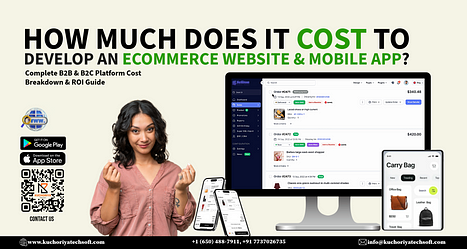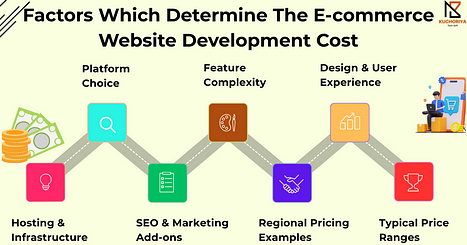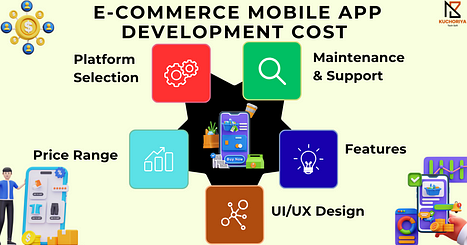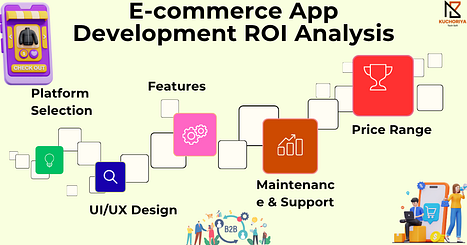
The Growing Demand for eCommerce Platforms
The global retail landscape is rapidly shifting towards digital commerce. For businesses, investing in a solid eCommerce platform is no longer optional — it is a strategic necessity to scale operations, reach wider audiences, and provide seamless customer experiences. The question on every business owner’s mind is: How much does it cost to develop an e-commerce website and mobile app?
Understanding the e-commerce website development cost and e-commerce app development cost is crucial for planning your digital journey. With mobile devices dominating user behavior, the e-commerce mobile app development cost has become a core consideration. Yet, a well-optimized website remains critical for SEO and brand visibility.
At Kuchoriya Techsoft, we have partnered with startups, SMBs, and global enterprises to build custom, scalable, and secure eCommerce platforms. Our experience shows that cost depends heavily on platform choice, features, region, and ongoing support. This guide aims to break down the eCommerce app development package pricing, B2B eCommerce platform costs, feature-based cost analysis, and more, empowering you to budget effectively.
eCommerce Website & App Development Overview
An eCommerce platform consists primarily of two components:
- The Website: A responsive, SEO-friendly portal optimized for desktop and mobile browsers.
- The Mobile App: Native or hybrid applications for iOS, Android, or Progressive Web Apps (PWA) offering seamless shopping experiences.
Both must integrate with backend systems, including payment gateways, CRM, and analytics tools, to enable smooth transactions and customer engagement.
Business models vary — from B2B marketplaces and multi-vendor platforms to B2C retail stores, which influences eCommerce platform feature-based pricing.
At Kuchoriya Techsoft, we specialize in:
- Custom-built eCommerce websites with SEO and marketing add-ons
- Custom eCommerce mobile app development, cost-optimized native and cross-platform apps
- Combined eCommerce website + app combo pricing packages
- Scalable multi-vendor eCommerce platforms
- Integration of AI-powered eCommerce platform development cost features and secure checkout + CRM integration cost for better user experience
How Much Does It Cost to Develop an eCommerce Website?

Several factors determine the e-commerce website development cost:
1. Platform Choice
- Shopify: Subscription-based, ideal for small to medium businesses, but limited in customization.
- Magento: Powerful and scalable for enterprises, but requires significant development effort and higher cost.
- WooCommerce: Cost-effective for smaller businesses using WordPress, but less suited for large-scale operations.
- Custom Development: Offers tailored features, high flexibility, and scalability at a premium cost.
2. Feature Complexity
Core eCommerce website features impact cost:
- Product catalog with filters and categories
- User account management and loyalty programs
- Secure checkout with shopping cart + payment gateway integration cost
- Inventory and order management
- SEO-friendly URLs and metadata
- Multi-language and multi-currency support for global reach
- Advanced analytics and reporting tools
3. Design & User Experience
A sleek, user-friendly UI/UX design tailored to enhance engagement and conversions increases development costs.
4. Hosting & Infrastructure
Scalable cloud hosting (AWS, Azure, Google Cloud) versus traditional on-premises servers affects pricing and uptime reliability.
5. SEO & Marketing Add-ons
SEO optimization, content marketing integration, social media sharing, and email marketing tools form essential SEO & marketing add-on pricing components.
6. Regional Pricing Examples
- eCommerce website development cost in India is affordable with quality results.
- North America (USA, Canada), the UK, and Europe tend to be more expensive due to higher labor costs.
- The Middle East (Dubai, UAE) is a growing market with competitive pricing.
7. Typical Price Ranges
- Basic eCommerce store: $5,000 — $15,000
- Medium complexity websites: $15,000 — $50,000
- Enterprise-grade/custom solutions: $50,000 — $150,000+
How Much Does It Cost to Develop an eCommerce Mobile App?

The e-commerce mobile app development cost breakdown depends on:
1. Platform Selection
- The iOS eCommerce app development cost is typically higher due to Apple’s strict guidelines.
- Android eCommerce app development pricing covers a wider device range but requires extensive testing.
- PWA eCommerce mobile app cost estimate solutions offer cross-platform compatibility at lower costs.
2. Features
Mobile apps include advanced features such as:
- Push notifications and personalized offers
- Easy login and social sign-in
- Intuitive navigation and search
- Secure wallet and checkout integration
- CRM and analytics integration for personalized marketing
- AI-powered recommendations and chatbots
3. UI/UX Design
Mobile-specific design is essential for usability on touch screens, which increases the eCommerce app UI/UX design pricing.
4. Maintenance & Support
Ongoing support, bug fixes, and version upgrades contribute to post-launch costs.
5. Price Range
- Basic mobile app: $20,000 — $40,000
- Feature-rich app: $40,000 — $100,000+
- Complex multi-vendor or AI-enabled apps: $100,000 — $200,000+
B2B eCommerce Platform Cost Breakdown
B2B platforms involve sophisticated requirements, driving up the B2B eCommerce platform software development cost:
- Complex bulk ordering, quotations, and approval workflows
- Custom pricing models per client or region
- ERP, supply chain, and CRM integrations
- Enhanced security and compliance features
- Multiple user roles and permissions
Typical Cost Ranges:
- Mid-sized B2B platform: $50,000 — $150,000
- Large enterprise B2B platform: $150,000 — $300,000+
At Kuchoriya Techsoft, we provide tailored B2B eCommerce development in the Middle East, Dubai, and global pricing that fits your scale and needs.
Explore more: Top 10 B2B eCommerce Website and Mobile App Development Companies
Top B2B eCommerce Website and Mobile App Development Guide 2025
B2C eCommerce Platform Development Costs
B2C platforms focus on:
- User experience and speed
- Loyalty and rewards programs
- Social media integrations and influencer marketing
- Mobile-first responsive design
Cost Estimates:
- Small to medium B2C stores: $30,000 — $80,000
- Large-scale B2C marketplaces: $80,000 — $150,000+
At Kuchoriya Techsoft, we go beyond just building eCommerce platforms. Whether you’re managing suppliers through vendor management services, streamlining workflows with Corso user interface integration, or incorporating electronic health records systems in health-related commerce, we provide scalable solutions across industries. From launching niche platforms like fantasy leagues — where we’re recognized as a top fantasy sport app development company — to offering tailored backend expertise when you hire CodeIgniter expert developers, our end-to-end capabilities ensure your digital product is efficient, future-ready, and ROI-focused.
Feature-Based Cost Analysis
Feature complexity greatly affects your investment:
- Multi-vendor marketplace functionality increases both scope and cost.
- AI-powered eCommerce platform development cost adds personalized shopping experiences.
- Cloud infrastructure affects cloud-based eCommerce app pricing and scalability.
- Secure checkout and CRM integration improve conversions and customer retention, impacting secure checkout + CRM integration costs.
- SEO and marketing tool integrations enhance traffic but require a budget for SEO & marketing add-on pricing.
Technology Stack & Infrastructure Pricing
Your e-commerce website development cost is significantly influenced by the technology stack and supporting infrastructure. Here’s how different components contribute to pricing:
🔹 Frontend Development
Modern, responsive UIs impact performance and user engagement.
- React.js — Popular for fast, dynamic interfaces
- Angular — a feature-rich framework with enterprise-level support
- Vue.js — Lightweight and ideal for flexible component-based design
🔹 Backend Technologies
Server-side logic, API handling, and database operations.
- Node.js — High-performance and scalable for real-time applications
- Laravel (PHP) — Developer-friendly and great for rapid prototyping
- Django (Python) — Secure, scalable, and perfect for data-heavy apps
🔹 Databases
Data management, speed, and scalability depend on database selection.
- MySQL — Reliable, relational, and widely supported
- MongoDB — NoSQL option for high-speed, flexible data storage
- PostgreSQL — Advanced relational DB with complex query handling
🔹 Cloud Infrastructure & DevOps
Cloud hosting determines uptime, scalability, and deployment speed.
- Amazon Web Services (AWS) — Industry leader with a wide toolset
- Microsoft Azure — Enterprise-grade scalability and compliance
- Google Cloud Platform (GCP) — AI-friendly, modern infrastructure
🔹 Performance & Security Tools
A stable, secure platform enhances customer trust and SEO.
- CDN Integration (e.g., Cloudflare, Akamai) — Faster load times globally
- SSL & Firewalls — Protect customer data and enable secure transactions
- DevOps Tools — CI/CD, containerization (Docker, Kubernetes), automated backups
Read also: How to Choose the Best B2B eCommerce Website and Mobile App Development Company
Region-Wise eCommerce Development Cost
The cost to build an e-commerce website or app can vary drastically depending on the region. Factors like developer expertise, local market rates, compliance requirements, and technological infrastructure influence overall pricing. Below is a breakdown of regional trends for B2B eCommerce software development.
1. 🇺🇸 United States — Clarence, New York
- Custom eCommerce software development cost in Clarence, New York, United States
- eCommerce mobile app development in Clarence, New York, United State
- B2B eCommerce platform solutions in Clarence, New York, United States
2. 🇨🇦 Canada — Mississauga, Ontario
- Affordable eCommerce website development in Mississauga, Ontario, Canada
- Multi-vendor marketplace app development in Mississauga, Ontario, Canada
- Cross-border eCommerce platform development in Mississauga, Ontario, Canada
3. 🇧🇷 Brazil — San Carlos, São Paulo
- Budget custom eCommerce software development in San Carlos, São Paulo, Brazil
- Latin America-focused eCommerce apps in San Carlos, São Paulo, Brazil
- Startup eCommerce website solutions in San Carlos, São Paulo, Brazil
4. 🇿🇦 South Africa — Sunnydale, Western Cape
- Outsourced eCommerce platform development in Sunnydale, Western Cape, South Africa
- Mobile-first eCommerce app design in Sunnydale, Western Cape, South Africa
- Responsive eCommerce UI/UX services in Sunnydale, Western Cape, South Africa
5. 🇪🇸 Spain — Guadalajara, Castilla-La Mancha
- EU-compliant eCommerce store development in Guadalajara, Castilla-La Mancha, Spain
- Multilingual B2B eCommerce software in Guadalajara, Castilla-La Mancha, Spain
- European marketplace app development in Guadalajara, Castilla-La Mancha, Spain
6. 🇦🇪 UAE — Dubai
- B2B eCommerce software cost in Dubai, United Arab Emirates
- eCommerce marketplace development cost in Dubai, United Arab Emirates
- MENA region digital commerce development in Dubai, United Arab Emirates
7. 🇮🇳 India — Multiple Tech Hubs (Delhi, Bangalore, Mumbai)
- Cost-effective eCommerce development in Delhi, India
- Hire dedicated eCommerce developers in Bangalore, Karnataka, India
- Scalable marketplace app development in Mumbai, Maharashtra, India
8. 🇮🇹 Italy — Formia, Lazio
- Design-focused eCommerce development in Formia, Lazio, Italy
- EU-regulated eCommerce platform cost in Formia, Lazio, Italy
- Bespoke online store development in Formia, Lazio, Italy
9. 🇸🇬 Singapore — Singapore
- Premium B2B eCommerce software in Singapore, Singapore
- Fast deployment eCommerce app development in Singapore, Singapore
- Scalable digital commerce platforms in Singapore, Singapore
10. 🇭🇰 Hong Kong — Tsim Sha Tsui
- High-security eCommerce development in Tsim Sha Tsui, Hong Kong
- Fintech eCommerce app development in Tsim Sha Tsui, Hong Kong
- Asian marketplace software development in Tsim Sha Tsui, Hong Kong
11. 🇦🇺 Australia — Sydney, New South Wales
- Reliable eCommerce website development in Sydney, New South Wales, Australia
- Multi-device eCommerce app development in Sydney, New South Wales, Australia
- Enterprise eCommerce platform solutions in Sydney, New South Wales, Australia
Team & Hiring Costs
Your team composition impacts the overall price:
- Hiring a dedicated eCommerce development team pricing varies by experience and region.
- Freelancers and full-time developers have different rates.
- UI/UX designers’ and e-commerce tech consultants’ charges add to budgets.
- Project managers and staff augmentation costs help scale projects efficiently.
- Offshore eCommerce app developers’ pricing offers savings but requires oversight.
Ongoing Costs After Launch
After deployment, maintaining your e-commerce platform involves key recurring expenses:
1. Support & Maintenance
- Regular updates, bug fixes, and performance tuning
- eCommerce website and app maintenance cost
- Security patches and compliance upgrades
2. SEO & Marketing
- Ongoing SEO service charges
- Paid ads, social media, and content marketing costs
- Tools for traffic analysis and campaign tracking
3. Cloud Hosting & Bandwidth
- Cloud hosting fees (AWS, Azure, GCP
- Bandwidth, CDN, and database storage costs
4. Customer Support
- Live chat, chatbot, and CRM platform subscriptions
- Support team expenses (in-house or outsourced)
eCommerce App Development ROI Analysis

Understanding the return on investment for e-commerce app development helps businesses make informed decisions. Here are six key ROI drivers:
1. Optimized Cost vs. ROI Balance: A smartly planned eCommerce app development cost leads to higher returns through automation and reduced manual operations.
2. Increased Market Reach: A well-built eCommerce web and mobile app allows access to global audiences across multiple devices and platforms.
3. Improved Customer Engagement: Push notifications, personalized UX, and loyalty features in a custom eCommerce solution keep users active and loyal.
4. Operational Efficiency: Integration of backend systems, real-time inventory, and order automation boosts productivity and reduces costs.
5. Higher Conversion & Retention Rates: Fast-loading pages, secure checkout, and smart recommendations improve e-commerce conversion rates and customer lifetime value.
6. Scalable Infrastructure for Growth: Cloud hosting and modular architecture ensure your eCommerce mobile app grows with your business without steep reinvestments.
MVP Development Cost for Startups
For startups, adopting a Minimum Viable Product (MVP) approach is a strategic way to enter the market with minimal risk and optimized investment. Focusing on core features allows early validation without excessive spending.
- Significantly reduce the MVP eCommerce app development cost by concentrating on essential functionalities
- Achieve faster time-to-market, enabling early user feedback and iterative improvements
- Validate market demand effectively before scaling the full eCommerce app development
- Minimize financial risks by avoiding overbuilding and unnecessary features in the MVP phase
- Establish a scalable MVP platform that supports seamless expansion as your startup grows
- Partner with Kuchoriya TechSoft for expert MVP development services designed to deliver quality and cost-efficiency for startups
Starting with an MVP allows startups to test assumptions and refine their product based on real user needs, ensuring smarter investment decisions. Efficient MVP development can be a game-changer for long-term success in the competitive e-commerce landscape.
Accurate budgeting is crucial for managing your e-commerce app development cost effectively. Planning helps avoid surprises and ensures your project stays on track financially.
- Prioritize must-have features to optimize the initial eCommerce app development cost
- Factor in hidden expenses such as licensing fees, regulatory compliance, and third-party integrations
- Choose the right technology stack and skilled development team to balance cost and quality
- Request detailed quotes for custom eCommerce app development packages to understand all cost components
- Consider scalability and budget for future feature additions and platform upgrades
Proper budgeting and cost estimation can save startups and enterprises significant time and money while delivering a high-performing, scalable eCommerce solution.
Conclusion: What’s the Real Cost of eCommerce Development?
The cost of eCommerce website development and eCommerce mobile app development depends on multiple factors, including platform type, feature set, technology stack, and ongoing support. Accurate budgeting is key when exploring custom eCommerce mobile app development, B2B marketplace app pricing, or headless commerce solutions.
Don’t overlook essential elements like SEO and marketing add-on pricing, shopping cart and payment gateway integration costs, and support and maintenance expenses — they directly impact your total investment and ROI.
At Kuchoriya Techsoft, we deliver scalable, feature-rich, and ROI-focused eCommerce website and app development backed by transparent pricing and expert consulting.
Contact us today to explore your best-fit eCommerce app development package and take the next step toward digital success.
Frequently Asked Questions (FAQs)
Q. How much does eCommerce website development cost?
A. The e-commerce website development cost depends on your platform (Shopify, Magento, WooCommerce, or custom), features, design, and scalability. A basic website starts around $5,000, while complex, custom-built platforms can exceed $50,000 or more.
Q. What is the e-commerce mobile app development cost breakdown?
A. The e-commerce mobile app development cost includes design, development, features like secure checkout, user login, and post-launch maintenance. A basic app starts at $20,000, while feature-rich or AI-powered apps can cost up to $200,000+.
Q. Is there a combined eCommerce website + app combo pricing package available?
A. Yes, Kuchoriya Techsoft offers eCommerce website + app combo pricing that saves you time and money by developing both platforms with shared infrastructure and consistent branding.
Q. How much does it cost to build a B2B eCommerce platform?
A. The B2B eCommerce platform software development cost typically ranges from $50,000 to $300,000, depending on features like bulk ordering, multi-user roles, ERP integration, and custom pricing models.
Q. Why are e-commerce mobile apps more expensive than websites?
A. Mobile apps involve additional costs for native development (iOS/Android), app store compliance, mobile UI/UX, testing on multiple devices, and updates, making them more resource-intensive than websites.
Q. Can I get an affordable e-commerce platform development cost?
A. Yes. You can achieve affordable eCommerce platform development by prioritizing an MVP, selecting scalable technologies, and partnering with experienced developers like Kuchoriya Techsoft for optimized results.
Q. What are the ongoing costs after launching an e-commerce platform?
A. After launch, you’ll incur eCommerce website and app support & maintenance costs, server fees, regular updates, SEO & marketing add-on pricing, and costs for adding new features or scaling.
Q. How do I estimate the cost of building a scalable eCommerce platform?
A. To estimate accurately, factor in eCommerce platform feature-based pricing, technology stack, team structure, hosting, and third-party integration. Kuchoriya Techsoft offers detailed cost estimators and custom quotes to guide you.
Q. What affects the total cost of eCommerce website and app development the most?
A. Key cost drivers include the number of features, platform type (Shopify, WooCommerce, Magento), shopping cart + payment gateway integration cost, UI/UX complexity, and whether it’s a B2B or B2C model.
Q. Is e-commerce app development worth the investment?
A. Yes. According to our eCommerce app development ROI analysis, businesses gain increased sales, better user engagement, and long-term growth. A custom app helps boost customer retention and market reach.


.jpg)
.jpg)

No comments:
Post a Comment